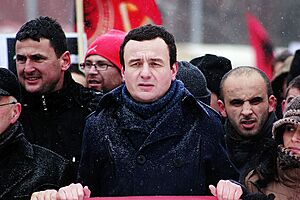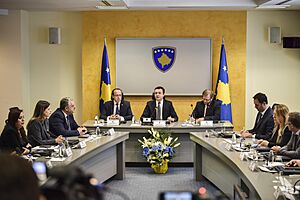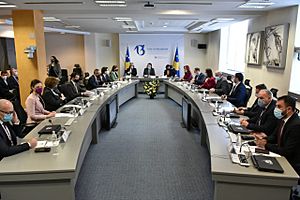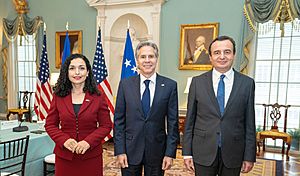Albin Kurti facts for kids
Quick facts for kids
Albin Kurti
|
|
|---|---|
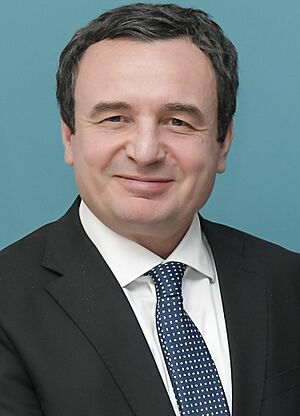
Kurti in 2023
|
|
| 4th & 6th Prime Minister of Kosovo | |
|
Caretaker
|
|
| Assumed office 22 March 2021 |
|
| President |
|
| Deputy |
|
| Preceded by | Avdullah Hoti |
| In office 3 February 2020 – 3 June 2020 |
|
| President | Hashim Thaçi |
| Deputy |
|
| Preceded by | Ramush Haradinaj |
| Succeeded by | Avdullah Hoti |
| Leader of the Opposition | |
| In office 3 June 2020 – 22 March 2021 |
|
| Preceded by | Kadri Veseli |
| Succeeded by | Enver Hoxhaj |
| In office 9 December 2014 – 3 February 2020 |
|
| Preceded by | Isa Mustafa |
| Succeeded by | Kadri Veseli |
| Leader of Vetëvendosje | |
| Assumed office 21 January 2018 |
|
| Preceded by | Visar Ymeri |
| In office 12 June 2005 – 28 February 2015 |
|
| Preceded by | Position established |
| Succeeded by | Visar Ymeri |
| Member of the Assembly of the Republic of Kosovo | |
| In office 2010 – 3 February 2020 |
|
| Personal details | |
| Born | 24 March 1975 Pristina, SAP Kosovo, SFR Yugoslavia |
| Nationality |
|
| Political party | Vetëvendosje |
| Spouse | Rita Augestad Knudsen |
| Children | 1 |
| Education | University of Pristina |
| Signature | |
| Military service | |
| Allegiance | |
| Political representative | |
| Service years | 1998–1999 |
Albin Kurti (born 24 March 1975) is a politician from Kosovo. He has been the Prime Minister of Kosovo since 2021. He also held this important job from February to June 2020.
Kurti became well-known in 1997 as a student leader. He helped organize peaceful student protests at the University of Pristina. Later, he worked with Adem Demaçi, who was a political representative for the Kosovo Liberation Army (KLA). Since 2010, Kurti has been a member of the Assembly of the Republic of Kosovo, which is like Kosovo's parliament.
Contents
Early Life and Education
Albin Kurti was born on March 24, 1975, in Pristina, which was then part of Yugoslavia. His father, Zaim Kurti, was an engineer from Montenegro. His mother, Arife Kurti, was a retired elementary school teacher from Pristina. Albin has two brothers, Arianit and Taulant.
Kurti completed his early schooling in Pristina. He later studied Telecommunications and Computer Engineering at the University of Pristina, graduating in 2003.
Student Activism and Early Career
Kurti first gained attention in October 1997. He was one of the main leaders of student protests in Kosovo. These protests were against the Yugoslav police taking over the University of Pristina campus. Albanian students and teachers were not allowed to use the university buildings. The protests were met with force, but Kurti and the students continued their peaceful resistance.
In July 1998, Kurti worked as an assistant to Adem Demaçi. Demaçi was a political representative for the KLA group. Because of these actions, Kurti became a target for the Yugoslav police.
In April 1999, during the NATO bombing of Yugoslavia, Kurti was arrested. He was first held in Dubrava Prison. As the Serbian army left Kosovo, he was moved to a prison in Požarevac. He was later accused of "endangering Yugoslavia's territory" and "planning enemy activities." He was sentenced to 15 years in prison.
Kurti was released in December 2001. This happened after Vojislav Koštunica, the President of Yugoslavia, pardoned him due to international pressure. After his release, Kurti worked outside of political parties. He often spoke out against the United Nations Interim Administration Mission in Kosovo (UNMIK) and against corruption. He organized peaceful protests to support families whose relatives disappeared during the war. He also supported Kosovo's right to self-determination.
On June 12, 2005, activists from the Action for Kosovo Network (AKN) wrote "No negotiations, Self-Determination" on UNMIK buildings. Police arrested many activists, including Kurti. AKN then changed its name to the Self-Determination Movement, known as Vetëvendosje. This movement called for a public vote on Kosovo's future. They believed a referendum was the only way for Kosovo to achieve a democratic solution.
In February 2007, Vetëvendosje organized a protest against the Ahtisaari Plan. They believed this plan would divide Kosovo based on ethnic groups. The protest became violent, and two unarmed protesters were killed by police. Kurti was arrested and held until July 2007, then placed under house arrest. He was later sentenced to nine months in prison. Kurti was a strong supporter of "active nonviolent resistance."
Political Career and Leadership
Vetëvendosje became a political party and ran in the 2010 Kosovan parliamentary election for the first time. Albin Kurti was their candidate for prime minister. The party won 12.69% of the votes and 14 out of 120 seats in the assembly. They became the third largest political group in Kosovo. Vetëvendosje did not agree with the Brussels Agreement between Kosovo and Serbia. Kurti and other Vetëvendosje members were removed from parliament by police for disrupting sessions.
Kurti ran for prime minister again in the 2014 Kosovan parliamentary election. Vetëvendosje came in third place again, winning 16 seats. Kurti and his party were involved in protests inside the parliament, sometimes using tear gas, which gained international attention.
In the 2017 Kosovan parliamentary election, Vetëvendosje grew much larger. They became the biggest individual political party in Kosovo, winning 32 seats and 27.49% of the votes. Albin Kurti received the most votes of any politician in Kosovo. During this time, Kurti was the leader of the opposition. His party worked with the LDK to put pressure on the government.
Prime Minister Ramush Haradinaj resigned in July 2019, leading to early elections in October 2019. In the 2019 Kosovan parliamentary election, Kurti's Vetëvendosje won the most votes, with 26.27% and 29 seats. Kurti became Prime Minister of Kosovo in early February 2020.
On November 26, 2019, a strong earthquake hit Albania. Kurti visited Durrës to see the damage and emphasized the need for cooperation between Kosovo and Albania.
On March 18, 2020, Kurti removed Interior Minister Agim Veliu from his position. Veliu had supported declaring a state of emergency for the coronavirus pandemic. This would have given more power to the Kosovo Security Council, led by Hashim Thaçi. The Democratic League of Kosovo, a partner in the government, then called for a vote of no confidence. On March 25, 82 members of the assembly voted against Kurti's government. This made it the first government to be voted out of power because of disagreements over handling the pandemic.
Kurti's government continued as a temporary government until June 3, 2020. At that time, Avdullah Hoti was elected as the new Prime Minister.
On January 26, 2021, Kurti was not allowed to run in the 2021 Kosovan parliamentary election. This was because he had been convicted of a crime less than three years before the election. Despite this, his party won by a large margin, with 50.28% of the votes.
In the elections of February 9, 2025, Kurti's political party won with 41 percent of the votes. Albin Kurti became the politician with the most votes in Kosovo's history, receiving 337,000 votes.
Prime Minister of Kosovo
On February 3, 2020, Albin Kurti was elected Prime Minister of Kosovo. He received 66 votes in favor, with 10 abstentions. Thirty-four opposition members did not participate in the vote.
One of the first decisions by Kurti's government was to lower the salaries of ministers back to their previous amounts. The Prime Minister's monthly salary, for example, went from €2,950 back to €1,500.
Kurti's government also planned to introduce a three-month period of military service in Kosovo. He believes this is important for the country's defense.
Kurti was elected Prime Minister of Kosovo for a second time on March 22, 2021. Sixty-seven members of the assembly voted for him, and 30 voted against.
Key Policies and Initiatives
Energy Development
In 2021, Kurti's government faced Kosovo's biggest energy crisis since 2010. This led to a state of emergency for energy on December 24, 2021. In July 2022, the United States gave Kosovo a grant of 236 million dollars for an energy project. This project will provide energy reserves using large batteries. These batteries can store electricity produced at one time to be used when demand is high.
The government invested in a Thermal Plant to increase electricity production by 30 MW. This also extends the life of TC Kosova B without increasing pollution. The government's first auction for Renewable Solar Energy, with a capacity of 100 MW, is open until January 2024.
Justice System Improvements
During his election campaign, Kurti promised to improve the justice system. After winning the elections, his government presented a plan for justice reform to the Assembly of Kosovo on September 4, 2022. On February 2, the government successfully passed a law about taking back unjustified assets. However, some opposition members criticized this law, saying it did not follow Kosovo's Constitution. They sent the law to the Constitutional Court of Kosovo for review.
Social Support Programs
For 2023, Kurti's government set aside 60 million euros for support payments for mothers and children. Children under 2 years old receive 20 euros per month. Children under 16 receive 10 euros per month. Unemployed mothers receive the minimum wage of 250 euros for 6 months of maternity leave.
The government also increased payments for children. Each child now receives 20 euros per month until age 16. Families with three or more children receive 30 euros for each child.
Kurti has also stated that Kosovo's economy has grown during his government's first three years. He mentioned that the economy has grown by over 1 billion euros each year. The government is also working to reduce poverty.
According to the Prime Minister, 150,000 workers in the private sector will receive higher salaries. A new law on health insurance has also been approved by the government and will be presented to the Assembly for final approval.
Fighting Organized Crime
Kurti has said that his government has made progress in fighting organized crime from 2021 to 2023. Kosovo Police have arrested over 3,800 people for serious crimes, including over 300 public officials. Working with Montenegro and North Macedonia, illegal roads along the borders have been closed. Twenty-four illegal roads in North Mitrovica, used for smuggling and illegal border crossings, have also been closed.
Strengthening the Kosovo Security Force
The Kurti government has increased the budget for the Ministry of Defense. In 2017, the budget for the Kosovo Security Force was 51 million euros. In 2022, it increased to 102 million euros, and in 2023, to 123 million. For 2024, 153 million euros have been set aside. The Security Force has bought six Bayraktar drones from Turkey and has made other agreements to buy weapons. More soldiers have also joined the Kosovo Security Force.
The U.S. government approved a possible sale of hundreds of Javelin anti-tank missiles to Kosovo for about $75 million. Kosovo asked to buy 246 Javelin missiles and 24 lightweight command launch units. Serbia has expressed disappointment about this possible sale. Serbian President Aleksandar Vučić said that Kosovo should not have an army because it goes against international law. Serbia still considers Kosovo part of its territory.
On November 27, 2024, Prime Minister Kurti signed a decision to start setting up Kosovo's defense industry. Later, on December 16, 2024, Kurti announced an agreement with the Turkish defense company MKEK. This agreement is for a factory in Kosovo to produce ammunition and drones.
Foreign Relations
Relations with Albania
Kurti did not support the "Open Balkan" project, which included Albania, Serbia, and North Macedonia. He believed that Serbia, being the largest producer in the region, would harm the economies of Albania and Kosovo if borders were fully opened for their goods.
During a visit to Tirana in 2020, Kurti spoke with Albanian Prime Minister Edi Rama. Kurti argued that economic projects should benefit Albanians and that trade cooperation between Albania and Kosovo should increase. Rama disagreed, saying that open borders would benefit the whole region.
The European Union has remained neutral on this initiative. They stated that the initiative would be successful if other countries like Kosovo, Montenegro, and Bosnia and Herzegovina also joined.
In June 2023, Rama announced that Albania had left the "Open Balkan" initiative. He said it had completed its purpose and it was time to focus on joining the European Union.
The Serbian government was surprised by this decision. Serbian Prime Minister Ana Brnabić said she would talk with the Albanian Prime Minister. She believed the "Open Balkans" project was not dead, as it was in the best interest of their nations.
Unification of Kosovo and Albania
Albin Kurti strongly supports direct democracy. He has often criticized Kosovo's Constitution for not allowing direct public votes. One topic he believes should be decided by a referendum is the possible unification of Kosovo and Albania. Kurti has continuously said that the third article of the constitution prevents such a vote. In 2018, Kurti stated that "We want Kosovo to have the right to join Albania, but we would not start a third Balkan war for this goal."
After the 2019 election, Kurti said that Kosovo Albanians were not seeking to join Albania in terms of territory or politics. Instead, they wanted "integration with Albania and the EU, through Kosovo's success as a state." However, Kurti has stated that if a referendum were held on unification, he would vote for it.
Relations with Serbia
Kurti has claimed that Serbia is a threat to Kosovo's safety. He says Serbia has built 48 military bases along the border with Kosovo. Kosovo's government has asked the United States to make Camp Bondsteel, where KFOR troops are stationed, a permanent American base.
In June 2023, the Government of Kosovo declared "Civil Defense" and "North Brigade" as terrorist organizations. They claim these groups attacked Kosovo Police and KFOR members in North Mitrovica and are supported by Serbia. Kosovo's allies said that the government did not talk to them before making this decision. On September 24, 2023, a group of armed Serbs attacked the Kosovo Police in the village of Banjska, killing a Kosovo policeman. Kosovo police killed three attackers, while the rest escaped into Serbia. The European Union called the attack a terrorist act. They asked Serbia to bring the attackers in Serbia to justice. The United States also asked Serbia to hand over Milan Radoičić, who is believed to have planned the attack, to Kosovo. Serbian President Aleksandar Vučić said that Serbia's justice system would handle Milan Radoičić. He would not be sent to Kosovo because Serbia does not recognize Kosovo as an independent state. Kurti has accused Russia of encouraging attacks by Serbs to make the region unstable.
When he was in the political opposition, Kurti was known for his strong views on talks between Kosovo and Serbia. He criticized Kosovo's approach to negotiations with Serbia. He said that talks should be based on conditions and fairness. He also wanted Serbia to pay war reparations to Kosovo and return stolen pension funds and artifacts.
After the 2019 election, Kurti said that "strong dialogue" and "fairness" were needed to improve relations with Serbia. Kurti stated that Kosovo first needed to talk with its Serb minority and the European Union before talking with Serbia. He considers future talks with Kosovo's minorities and the EU a top priority.
During his second term as prime minister in 2023, Kurti participated in talks with Serbian President Aleksandar Vučić. These talks were led by the European Union and resulted in the Ohrid Agreement. Based on Kurti's policy of fairness in talks with Serbia, the agreement requires both sides to recognize each other's national symbols and official documents. However, it does not require Serbia to formally recognize Kosovo as an independent country. The plan for putting this agreement into action is still being worked on.
Relations with the United States
During his first term as prime minister, Kurti had a difficult relationship with Donald Trump and his government. Kurti accused Trump's special envoy, Richard Grenell, of discussing a land swap between Kosovo and Serbia.
Kurti's opponent Hashim Thaçi was supported by Grenell. Grenell demanded that Kosovo remove tariffs on goods from Serbia without conditions. This was so a "deal" he supported, which involved direct rail and air connections between Kosovo and Serbia, could happen quickly. Kurti responded by saying that Kosovo would only remove tariffs if Serbia also removed its trade restrictions.
In October 2020, Kurti supported Joe Biden for U.S. president.
Kosovo's government accepted the U.S. request to shelter refugees from Afghanistan. Kosovo has sheltered Afghan citizens who were at risk because they worked with the United States and NATO. An agreement between the United States and Kosovo allowed the U.S. to temporarily shelter a limited number of Afghan citizens. These were people whose visa applications for the U.S. needed more processing. About 700 refugees were sheltered at Camp Bondsteel, located in Ferizaj.
Relations with Greece
Prime Minister Albin Kurti has visited Greece several times. He has also taken part in various forums, such as the "Delphi" economic forum in 2022. The Foreign Minister of Greece, Nikos Dendias, visited Pristina and met with Prime Minister Kurti. They discussed cooperation between their countries.
Dora Bakoyannis, a Greek politician, prepared a report for the Council of Europe about Kosovo. She stated that Kosovo meets the requirements to be a member of the Council of Europe. Her report was approved by most votes in the Council of Europe. This caused a reaction from Serbia. According to the Serbian government, Dora Bakoyannis had harmed the "friendly" relations between Serbia and Greece with her recommendation for Kosovo to join the Council of Europe.
Good relations with Kosovo have led Greece to increase its trade with the country. According to the GAP institute, Greece has exported goods worth 330 million euros to Kosovo. Greece recognizes Kosovo's official documents and has an office in Pristina.
Relations with Albanian Political Parties in North Macedonia
Albanian parties in Kosovo work with Albanian political parties in North Macedonia. According to census data, 446,245 Albanian people live in North Macedonia. This is 24.30 percent of the total population. The number of Albanians increases to 29.52 percent (619,187) when citizens living in other countries are included.
Political leaders in Kosovo have always supported the Albanian party in North Macedonia, the Democratic Union for Integration (BDI), led by Ali Ahmeti. Ahmeti was part of the government in North Macedonia as a partner with Macedonian parties.
However, the new government led by Albin Kurti announced that relations with Ali Ahmeti had become difficult. Kurti was against the "Open Balkan" initiative, which included Serbia, North Macedonia, and Albania. He believed this economic initiative favored Serbia and harmed the economies of neighboring countries. Because of this, he had disagreements with Ali Ahmeti, who was part of North Macedonia's government.
Kurti had accused Ali Ahmeti of supporting the idea of Kosovo's president, Hashim Thaçi, about possibly exchanging territories between Serbia and Kosovo. Kurti was against any exchange of territories. In the 2024 elections in North Macedonia, an Albanian party called "VLEN" was formed. Kurti met with representatives of this political group and supported them in these elections. The leader of VLEN is Arben Taravari, who was also the mayor of Gostivar.
Bujar Osmani, a high official of the Democratic Union for Integration, accused Kurti of interfering in the elections. However, he believed these actions would not affect Albanian voters. Osmani stated that his party would win seats and be part of the government again.
EFTA Agreement
Kosovo signed an agreement with the European Free Trade Association (EFTA) on January 22, 2025. This happened after more than two and a half years of talks.
Removing tariffs is one of the benefits for Kosovo companies that export or want to export to EFTA member countries. EFTA members include Switzerland, Iceland, Liechtenstein, and Norway. Trade between Kosovo and EFTA began in 2008, after Kosovo became independent. Since then, trade has grown steadily, reaching its highest level in 2023: 176 million euros.
Kosovo mainly exports goods like furniture, plastics, iron, steel, and wood products to EFTA countries. It imports vehicles, medicines, tobacco, and machinery from them.
Personal Life
Kurti is married to Rita Augestad Knudsen, a researcher from Norway. They have one daughter. He speaks Albanian, Serbian, and English. Besides being a citizen of Kosovo, Kurti also has Albanian citizenship and has voted in Albanian elections.
See also
 In Spanish: Albin Kurti para niños
In Spanish: Albin Kurti para niños
 | Jessica Watkins |
 | Robert Henry Lawrence Jr. |
 | Mae Jemison |
 | Sian Proctor |
 | Guion Bluford |


